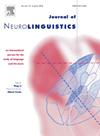注意调节AoA对二语元音感知的影响
IF 1.2
3区 心理学
Q2 LINGUISTICS
引用次数: 0
摘要
习得年龄(AoA)可能会对第二语言学习产生长期影响,例如元音感知,特别是在浸入式环境中。然而,重要的是要注意,第二语言学习的早期开始可能对所有学习者都同样重要。确定调节AoA效应的关键个体特征对于阐明AoA效应的性质至关重要。本研究旨在探讨非沉浸式第二语言学习情境下的AoA效应的意义,并探讨个体特征(如第二语言熟练程度、一般听觉加工和注意转换能力)是否会调节这种效应。58名非浸入式英语学习十年以上的汉语母语大学生参与了英语元音感知、非语言语音感知和注意转换能力的评估任务。结果表明,非浸入式中国英语学习者的AoA效应仍然显著。此外,较强的个人注意转换和较高的英语听力水平,而不是听觉加工能力,缓冲了AoA效应。即使在控制了英语听力水平的调节作用后,注意转换的调节作用仍然显著。对于注意力转换较慢(P3潜伏期较长)的学习者来说,较早开始第二语言学习可能对语言感知的学习特别重要,而对于注意力转换较快(P3潜伏期较短)的学习者来说,较早开始第二语言学习则不是那么重要。这一发现是第一个强调非沉浸式情境下AoA对第二语言学习的影响可能因学习者的认知能力而异的实证证据。本研究将对AoA效应复杂性的认识扩展到更具体的个体特征。本文章由计算机程序翻译,如有差异,请以英文原文为准。
Attention moderates the AoA effect on second language vowel perception
Age of acquisition (AoA) may have long-lasting effects on second language learning, such as vowel perception, especially in immersion contexts. However, it's important to note that an earlier start of second language learning may not be equally important for all learners. Identifying the key individual characteristics that moderate the AoA effect is essential to elucidate the nature of the AoA effect. This study aimed to investigate the significance of the AoA effect in a non-immersion second language learning context and examine whether individual characteristics, such as second language proficiency, general auditory processing, and attention switching abilities may moderate this effect. Fifty-eight native Chinese-speaking university students, with over ten years of non-immersion English learning, participated in tasks assessing English vowel perception, non-linguistic sound perception, and attention switching ability. The results showed that the AoA effect remained significant among non-immersion Chinese English learners. Moreover, stronger individual attention switching and higher English listening proficiency, but not auditory processing ability, buffered the AoA effect. The moderating effect of attention switching remained significant even after controlling for the moderating effect of English listening proficiency. Earlier start of second language learning may be particularly important for learners with a slower attention switch (indicated by a longer P3 latency) to learn speech perception, while not so much for those with a quicker attention switch (indicated by a shorter P3 latency). The findings were the first empirical evidence highlighting that the AoA effect on second language learning in non-immersive contexts may differ by learners' cognitive ability. The present study expanded the knowledge of the complexity of the AoA effect to more specific individual characteristics.
求助全文
通过发布文献求助,成功后即可免费获取论文全文。
去求助
来源期刊

Journal of Neurolinguistics
医学-神经科学
CiteScore
3.90
自引率
5.00%
发文量
49
审稿时长
17.2 weeks
期刊介绍:
The Journal of Neurolinguistics is an international forum for the integration of the neurosciences and language sciences. JNL provides for rapid publication of novel, peer-reviewed research into the interaction between language, communication and brain processes. The focus is on rigorous studies of an empirical or theoretical nature and which make an original contribution to our knowledge about the involvement of the nervous system in communication and its breakdowns. Contributions from neurology, communication disorders, linguistics, neuropsychology and cognitive science in general are welcome. Published articles will typically address issues relating some aspect of language or speech function to its neurological substrates with clear theoretical import. Interdisciplinary work on any aspect of the biological foundations of language and its disorders resulting from brain damage is encouraged. Studies of normal subjects, with clear reference to brain functions, are appropriate. Group-studies on well defined samples and case studies with well documented lesion or nervous system dysfunction are acceptable. The journal is open to empirical reports and review articles. Special issues on aspects of the relation between language and the structure and function of the nervous system are also welcome.
 求助内容:
求助内容: 应助结果提醒方式:
应助结果提醒方式:


